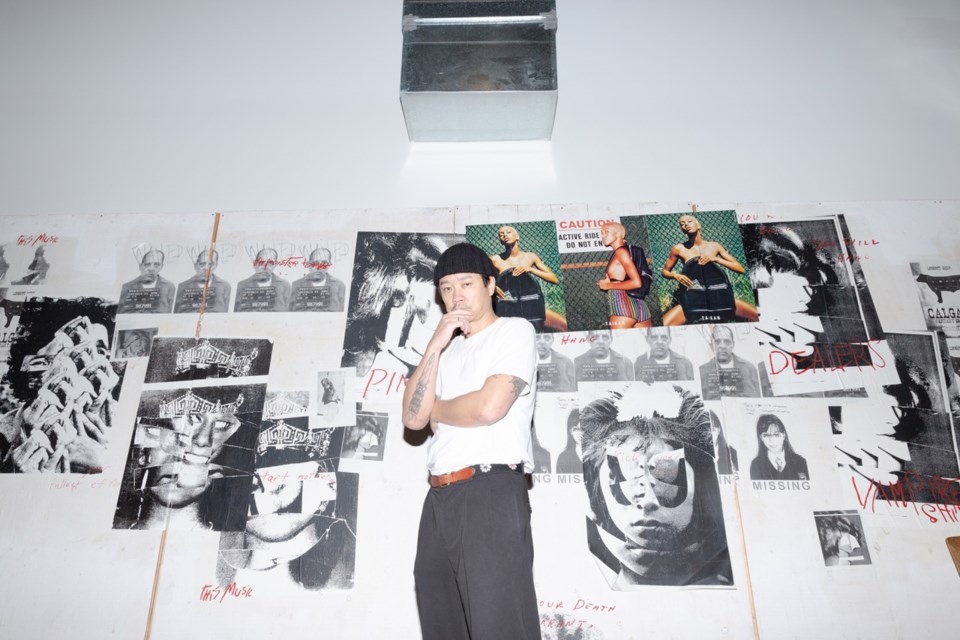Garret “GMAN” Louie probably has one of the most interesting and varied resumes in Vancouver. And to fully understand the road to his streetwear clothing brand , one must first look at the timeline of his career.
The serial entrepreneur has been in the world of fashion, music, skateboarding, and the business of general coolness for over 30 years but he says that all of the different ventures align and came to him organically.
At 18, GMAN co-owned a sales agency called that took him on the road to clothing tradeshows and while at one in California he discovered a line called . They were at an underground party as part of the tradeshow when he first came across the first streetwear brand in the world but GMAN says that at the time, the term streetwear didn’t really exist yet.He knew he wanted to start importing the brand and that eventually led to the launch of his clothing distribution company which celebrates its 30th anniversary this year. After Freshjive he also brought on skateboard products and other brands like and now Timebomb has about 15 brand partners and a sister company, .
Time to party (and then party some more)
But it was the way he discovered Freshjive at a party that sparked his unique and enduring approach that ultimately influenced the trajectory of his career as well. “The way that I was going to promote that brand was the same way that I discovered it,” he explains, “by throwing my own party here in Vancouver, the whole reason to do that was to promote it. Get it on DJs and tastemakers around the city.”GMAN rented a warehouse and enlisted friends to help, he put the Freshjive logo on the flyers and 1800 people showed up to the inaugural party. That’s when he thought to himself “a party thing itself could be a viable business–fun to do great to the culture.”
“I ended up throwing another party and another party,” he says. “25 years worth of parties later I became this promoter under GMAN and Rizk (my partner’s name is Rizk) and we ended up promoting many clubs in the city over those years.”
At one time GMAN had four club nights a week even though it was a side hustle. In between promoting, his distribution business was also taking off and he was building a network on both sides of the events, music (he was also a DJ), and fashion industries when a friend asked if he wanted to partner in a sneaker store. He sold during COVID but for the 18 years he owned it they also opened locations in Toronto and Winnipeg.After being a promotor for several years GMAN had the opportunity to open his own venue which became Fortune Sound Club. “As we were promoting at all these other clubs, I kind of felt that a lot of our crowds–which were kind of in the skateboard world, snowboard world, all the stuff I was doing at the time on the side–I felt that a lot of our crowd wasn't getting respected in other venues,” he says. “They were kind of these typical clubs, and they weren't really built for musicheads and because my partner and I were DJs and true musicheads and the sound systems always suck at that these places…we wanted to build a place that was friendly for our crowds and for musicheads.”
So with all of that experience under his belt and working to promote other people's creative projects it finally came time to ask, “why don't we work on our own projects? Our own brand after building all these other brands.”
Building their own brand
Taikan started a few years ago as a bag brand but has since evolved into a capsule collection of versatile streetwear that showcases artists, photographers, skateboraders, DJs, and other creatives throughout Canada both on the clothing and through the brand’s marketing.GMAN says he loves and admires the work of the people Taikan collaborates with so much that he hands over the product and the reigns to see what magic they can create. It makes for extremely varied ad creative but that fits into the vibe and ethos of Taikan.The series Taikan By tells the stories of these creatives such as Tyler Warren, DJ Pump, Jomar, and the team behind Pizza Coming Soon. And since GMAN is such a self-professed musichead they often feature Spotify playlists for each collab.
'Â鶹´«Ã½Ó³»is really special'
GMAN thinks that Â鶹´«Ã½Ó³»has a unique melting pot of influences that have helped raise a lot of the brands that he watched grow from the ground up. He cites the proximity to US border, the European sensibilities from being part of the commonwealth and the French identity here in Canada, as well as the large Japanese and Korean population bringing in a thriving streetwear scene from Asia.
“Â鶹´«Ã½Ó³»is really special,” he says and being based here gives him a great perspective for designing for the globe.
His work as a distributor also helped him identify what he did and didn’t want. “A lot of the brands have a lot of logos,” he observes. “And as I'm getting older, I just like things a little bit cleaner. You know, there's times where I'm like, Oh, that'd be amazing if it didn't have X written right across the chest.”
He found himself reaching for the overly branded clothing less and less and when he went through a phase during the pandemic where was selling all of his clothes and decluttering to the point of a minimal wardrobe, he discovered that the “perfect plain black hoodie,” never got old.Taikan was born from the concept of being the glue to hold together all the brands in GMAN’s warehouse that have logos. “I felt that there was a need for a minimalist, gender-neutral, attainable pricing brand–really great quality, really clean with the branding,” he says “and that basically our design concept for apparel.”



